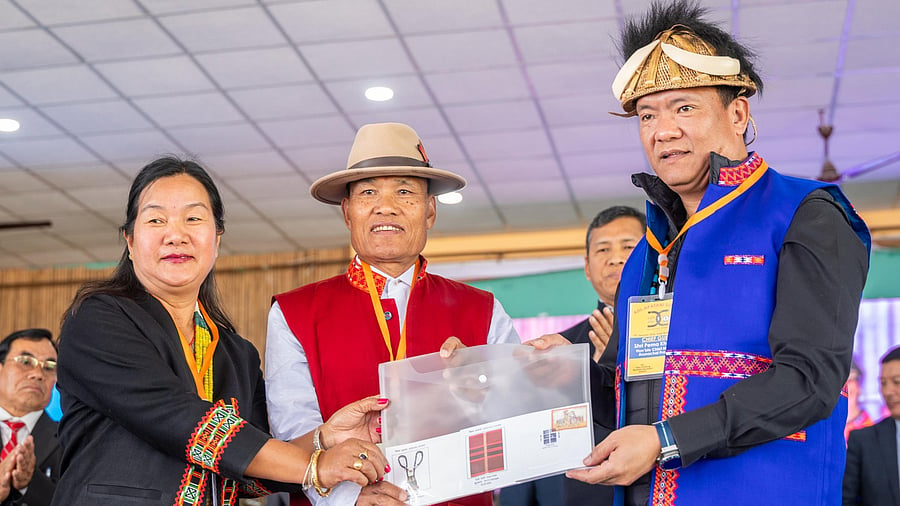
The repersentatives of Adi and Apatani, two major tribes of Arunachal Pradesh, signing the joint declaration.
Credit: Arunachal Pradesh government
Guwahati: Taking a significant step towards promoting unity and preventing communal discord, Adi and Apatani, two major tribes of Arunachal Pradesh on Sunday signed a "joint declaration" in order to do away with their traditional revenge practice, promote inter-tribe marriages and cultural exchanges.
The declaration was signed between Adi Bane Kebang (ABK) and Tanii Supun Dukun (TSD) -- the apex bodies of the two tribes at Pasighat, the headquarters of the Adi-dominated East Siang district, during the first Adi-Apatani Summit of 2025. Chief Minister Pema Khandu, Home Minister Mama Natung, besides several other leaders representing both the communities attended the "historic" event.
The declaration adopted at least 13 resolutions that included non-imposition of customary laws of one tribe on the other or be given precedent for any dispute resolution, any criminal or civil offence committed by individuals or groups shall not be allowed to be tagged as communal issue. "Any individual disputes or controversies over motor accidents, marriages, theft, property and land disputes of individual, family, clan or village shall not be construed as a communal issue."
"Both the communities shall uphold social and communal harmony, confidence building measures by encouraging inter-tribe marriages on mutual consent, social and cultural exchanges."
"They shall encourage their members to participate in traditional festivals like Solung, Unying Aran, Etor, Donggin, Podi Barbi, Dree, Murung and Myoko, so that the younger generations shall have opportunities to inter-mingle so as to learn and respect each other's culture and identity," said the declaration. "All disputes or issues, whether individual or communal, shall be resolved through dialogue," it said.
Taku Chatung, general secretary of Tanii Supun Dukun and one of the signatories of the declaration for the Apatanis, told DH on Sunday that it was a "historic agreement" that will allow amicable settlement of communal discord and prevent trivial conflicts taking shape of communal colour. "This will promote brotherhood and harmony." "There were instances where people used to resort to traditional revenge systems, such as attack in response to an attack, theft to counter a theft or destroy crops. The declaration will prevent such practices aiding in conflict and communal tension."
Adis, the second largest tribe among the 26 major tribes in Arunachal Pradesh, mainly inhabit East Siang, Upper Siang, West Siang and Shi Yomi districts while the Apatanis, with a population of less than one lakh, live mainly in Lower Subansiri district.
Repersentatives of Adi and Apatani, two major tribes of Arunachal Pradesh, signing the joint declaration.
Credit: Arunachal Pradesh government
CM Khandu, who attended the event, hailed the ABK and TSD saying that the declaration would set an example for other tribes too. "By coming together and signing this historic joint declaration, both communities have reaffirmed their commitment to peace, unity, and the continued well-being of their people. This declaration is not just a piece of paper — it is a living, breathing testament to the enduring values of love, respect, and mutual trust that have defined both the Adi and Apatani cultures for generations."
Khandu pointed out that both the communities have long shared a bond — dating back to the times of ancient Abotani, considered progenitors of the Tani tribes. "In the modern era, differences — whether small or large — have the potential to flare up into conflicts, if not vigilant. We cannot afford to let petty misunderstandings or rumors disrupt the harmony that has been carefully nurtured over generations."
"Instead, we must face these challenges with maturity, understanding, and mutual respect,” Khandu said.
Adi, Galo, Tagin, Nyishi and Apatanis consider Abotani as their progenitors. The Apatanis and Nyishis had signed a similar agreement in 2015, in order to promote unity and prevent communal discord in the communally diverse state.